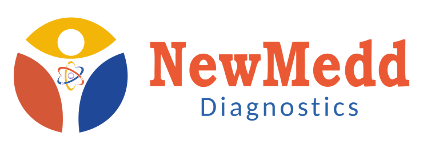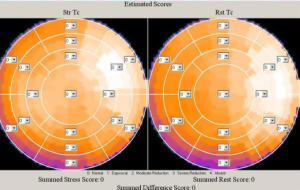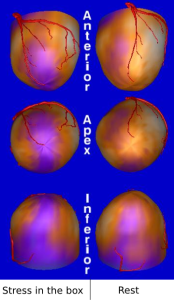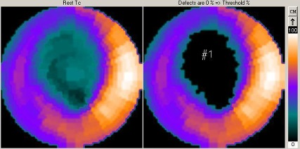Cardiac SPECT
Myocardial perfusion imaging (MPI) is a non-invasive procedure used to test for significant coronary artery disease (CAD). This diagnostic and prognostic study determines the degree and area of compromised blood flow to the heart as well as pumping function and existence of scarred heart tissue. Small amount of radiotracers are injected intravenously during resting state and during stress state (walking on a treadmill or pharmacological stress) which gets bound to the heart muscle. Blood pressure and electrocardiogram monitoring is done during the procedure. Healthy heart muscle, receiving normal blood flow, will accumulate more of the radiotracer than that supplied by diseased coronary arteries.

MPI: One scan – multiple information
- resting ECG
- Stress ECG (during TMT or pharmacological stress)
- Blood flow to the heart during rest and during stress
- Left ventricular pumping function: ejection fraction, wall motion and wall thickening
- Viable v/s scarred heart muscle: salvageability
With improved diagnostic accuracy over regular stress tests, abnormal perfusion scans are highly indicative of coronary artery disease. MPI is used to select patients for angiograms / angioplasty / bypass versus medical management; it is also most useful in monitoring efficacy of any of these management strategies.
Coronary angiography (conventional or CT) and MPI provide different and complementary information for diagnosis and evaluation of CAD, namely, detection of atherosclerosis versus detection of ischemia, which are quite different but have a definite internal link for each other. MPI provides the hemodynamic significance of lesions detected by coronary angiography, which is very important in developing the further therapeutic strategies. Patients with angiographically confirmed CAD, but negative MPI results have been shown to have similar low event rates.
MPI is the most commonly performed nuclear imaging study in the US; around 10 million studies being done every year. It is the most appropriate test in evaluating patients with intermediate risk for CAD before doing angiograms, according to such societies like American college of cardiology foundation, American society of nuclear cardiology, American heart association etc. (ACCF/ASNC/ACR/AHA/ASE/SCCT/SCMR/SNM guidelines)
At NewMedd Diagnostics, we have a dual head gamma camera for faster acquisition, improving patient comfort during the study and to minimize motion artifacts. With the latest xeleris and emory Cardiac Tool Box softwares, three-dimensional image of the heart can be obtained depicting the blood flow to the heart under stress and resting conditions. Quantitative parametric assessment and scoring is done to improve the accuracy of the interpretation.
Indications for MPI
1. Screening for Ischemic Heart Disease:
- Baseline ECG abnormalities, Bundle branch blocks etc
- False +ve / -ve Stress (TMT) test; (females, obese patients)
- Pharmacological stress in patients unable to exercise
- High risk individuals (Hypertensive patients, smokers, elevated homocysteine, hyperlipidemia, thrombogenic states , stroke, peripheral artery disease, family history, long term survivors of cancer patients who have received radiation to chest a part of initial treatment etc.)
- Detects silent ischemia, Microangiopathy (Diabetics, Renal failure)
2. Resting MPS:
- Recent heart attack: in patients who have not undergone primary revascularization
- Recent chest pain with high clinical probability of heart attack but negative cardiac enzymes
- No chest pain but elevated cardiac enzymes
3. Heart Failure Patients: to Differentiate ischemic vs. non-ischemic cardiomyopathy
4. Viability Studies : Before angioplasty / bypass surgery
5. Preoperative work up of major non cardiac surgeries (joint replacements/organ transplants/Gastrointestinal and genitourinary surgeries etc).
Our Services
-
PETCT Scan
In one continuous full-body scan (usually about 30 minutes), PET captures images of miniscule changes in the body’s metabolism caused by the growth of abnormal cells.
-
Nuclear Medicine
NM is a specialized form of medical imaging where small amount of radioactive isotopes are attached to molecules or chemicals which then form “Radiopharmaceuticals”.
-
SPECT
Myocardial perfusion imaging (MPI) is a non-invasive procedure used to test for significant coronary artery disease (CAD).
-
Radionuclide Therapy
Many radioisotopes, radio labelled conjugates are available for treatment of difficult medical conditions; Some of them are the treatment of choice for the given conditions.
-
Multi Slice CT
CT Scan or computed tomography is a painless and a non-invasive medical test that helps physicians diagnose and treat medical conditions.
Why choose us:
-
Latest in technology
-
High qualified consultants
-
Quick turn around




